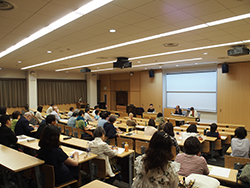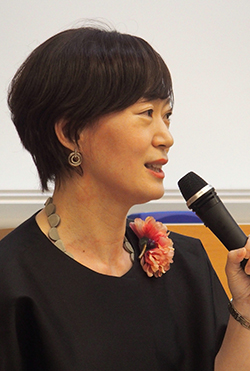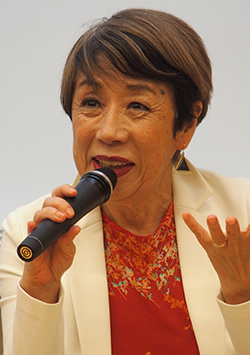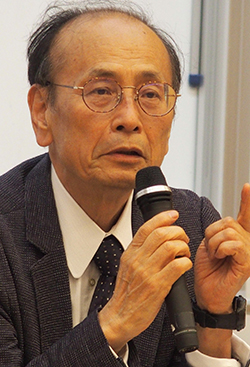The Politics and Gender in East Asia Research Project held a film screening on the Japanese Constitution, The Choice is Ours: What is the Future of the Japanese Constitution, followed by a discussion with director Hisako Matsui, and a special guest, pundit, and former diplomat, Mr. Ukeru Magosaki.
After the film screening, Prof. Ki-young Shin (Ochanomizu University IGS) shared her comments, and together with Ms. Matsui, Mr. Magosaki and the attendees, engaged in a discussion about the political situation in Japan, particularly the younger generation’s apathy toward constitutional reform. Hiroaki Itai (Ochanomizu University IGS) served as the moderator.
Prof. Ki-young Shin pointed out that discussion of constitutional reform has been focused almost entirely on the issue of national security and Article 9, but the proposed constitutional reforms are not limited to Article 9—they also include articles 13 and 24 that address individuals and families. The Choice is Ours: What is the Future of the Japanese Constitution focuses on how people understand and benefit from the constitutional provisions that underpin the inviolate rights of the individual. Most of all, it is regarded for the way it lifts up the voices of many diverse women.
Director Matsui mentioned how she held a similar screening of the film in Seoul, South Korea in February, and described a marked difference in political intensity when comparing young people from South Korea and Japan. Even though the film is solely concerned with constitutional reform in Japan, many of the young people in the Korean audience took the issue seriously, leading to a lively discussion later. Meanwhile, in Japan, despite holding screenings all across the country, the attendees were almost exclusively middle-aged. The disinterest of the younger generation was notable.
The retired diplomat, Mr. Magosaki, spoke about Japan’s national security and constitution, particularly with respect to the situation with North Korea and Article 9. The current Abe administration seeks to use the North Korean crisis as the reason behind seeking constitutional revision, and changes to the nation’s electoral system to enable such reform, but revising Article 9 will not make the North Korean crisis go away. This, he said, is because a diplomatic problem cannot be resolved by revising the constitution.
The discussion kept going as the attendees were asked to speak. At the request of Ms. Matsui, who asked for the youth to share their opinions, a young woman shared her frank impression of the film. Everything depicted in the film was new information to her, she said. It was one surprise after another, leaving her feeling so overwhelmed that she could not think about the constitution and civil rights. The film, she said, left her in a state of confusion. Next, an attendee from China shared her opinion that revision of Japan’s constitution would likely lead to instability in the Asia region.
One middle-aged attendee asked that in the current crisis of Japan’s political situation, what should be done to get the youth, in particular, more interested in the constitutional problem. In response, Matsui stated that her motivation for making the film was a desire for people, as individuals, to reflect personally on the subject of constitutional reform. Matsui suggested that the attendees should hold their own screenings of The Choice is Ours: What is the Future of the Japanese Constitution as one way of getting people to think about constitutional reform.
Due to the topical nature of the film’s theme, the screening was followed by heated discussions, and the seminar proved to be a call for action for younger viewers in the audience.





